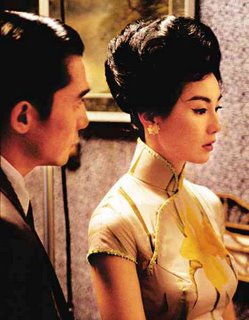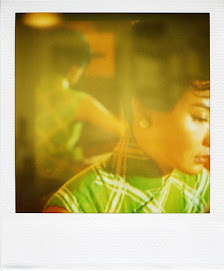
As mentioned in my very first post, i am really passionate about the Chinese dress called the QiPao or Cheongsam...It is an exquisite dress born out of a fusion of the East and the West, being at once sexy and modest. It exudes elegance and composture and eccentuates the feminity of a woman. Its defining features are a high collar covering the neck which was traditionally regarded as a sensual area of a woman which had to be covered but which also emphasizes its sexiness,fastening at the sides, as well as high slits on both sides of the legs.
The modern Chinese dress had its origins in the costume of the Qing dynasty in China and was originally a Manchurian costume, with China being ruled by the Manchus during the Qing Dynasty. With the collapse of the Qing dynasty in 1911, the Chinese dress also underwent changes. Initially women did not wear the QiPao/Cheongsam and wore a 2 piece set whilst men wore a loose fitting garment similar to the Chinese dress. However, by the late 1920s women also started to wear garments similar to the QiPao/Cheongsam and by the early 1930s, especially in Shanghai, the Chinese Dress became a popular daily wear for women. Throughout the 1930s and 1940s, the QiPao/Cheongsam grew in popularity as women in all walks of life adopted it as their preferred garment of choice, from teachers to politicians' wives, from film actresses to prostitutes. In the 1930s-40s the QiPao/Cheongsam was loose-fitting, had a low collar, and the hem went from mid-calf to the ankles. Frog buttons and piping at the edges were used and women alternated between collar sleeves that hung just over the shoulders to 3/4sleeves to long sleeves.
However, with the establishment of the PRC in 1949, the Chinese Dress fell out of popularity with Chinese women as it did not fall in line with the new Communist ideology which promoted utilitarianism and plainess which the Qipao/Cheongsam was in conflict with given its feminine image and excessive beauty. The Qipao/Cheongsam was worn less and less by women in Mainland China that by the 1960s, few women in China wore it at all.If there were still any Chinese dress wearers in China by the 1960s, they went virtually extinct during the 1966-1976 Cultural Revolution in China which virtually banned the Chinese Dress along with scores of other traditional culture which were all deemed as 'bourgeious decadence and feudalistic'.
The Chinese Dress is making a comeback nowadays in China with it being the official costume worn by women in many official ceremonies as well as worn by many Chinese women during weddings or parties.
As for the Chinese communities outside China, such as in Hong Kong, Taiwan, Malaysia and Singapore, the QiPao/cheongsam had a longer lifespan. It grew much tighter and body hugging in the 1950s in line with western influences and trends of the time, and the collar gradually rose such that by the end of the 1950s, a high stiff collar became the indisputable fashion of the day. Chinese style buttons also dissapeared with fasteners replacing them and piping also gradually went out of fashion. Like in the earlier decades, a Qipao/Cheongsam was often worn with a matching jacket and high heel shoes as well as a necklace made of pearls and handbag. Movie stars of that era frequently wore it further glamourising its image and variations were made according to the status of the women such as looser plainer Chinese dresses for teachers and elite social circle wives whilst prostitutes wore tighter, high slit ones. By the end of the 1960s however, the QiPao/Cheongsam lost popularity as well in the overseas Chinese communities, as cheap western style mass produced clothing became widely available and women found the Qipao/Cheongsam unduly restrictive on their movements due to its body hugging nature.
Now, the QiPao/Cheongsam can mainly be seen in TV dramas,films as well as is worn by some politician's wives, occassionally by film actresses when attending award ceremonies, beauty pageants, as well as in a handful of schools in HK as girl's uniforms. It is also the uniform of Taiwan's China Airlines Air Hostesses.
In 2000, the film, 'In the Mood For Love' by the acclaimed director Wong Kar Wai and starring extremely well known Maggie Cheung and Tony Leung brought a new explosion of interest in the QiPao/Cheongsam given the countless number of beautifully made cheongsams adorning Maggie Cheung's body in the 1960s set film. It is hoped that one day, women, and not only Chinese women, will come to appreciate the elegance of the QiPao/Cheongsam and that there will be another boom in the QiPao/Cheongsam again.....











































